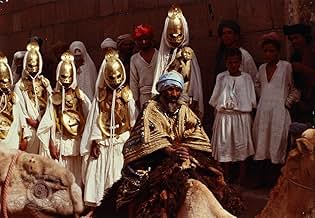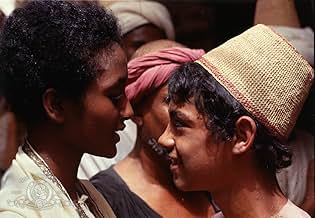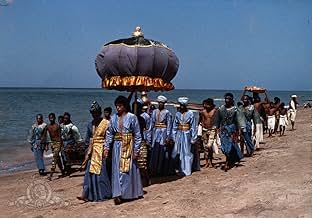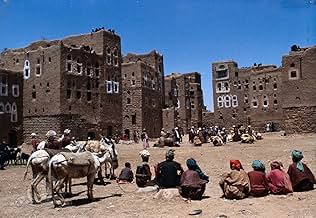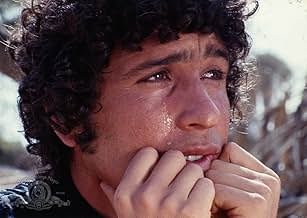CALIFICACIÓN DE IMDb
6.6/10
9.6 k
TU CALIFICACIÓN
Antigua Arabia. Una hermosa esclava elige a un joven para que sea su nuevo amo. Después es secuestrada y deben buscarse el uno al otro. Las historias se cuentan dentro de las historias: el a... Leer todoAntigua Arabia. Una hermosa esclava elige a un joven para que sea su nuevo amo. Después es secuestrada y deben buscarse el uno al otro. Las historias se cuentan dentro de las historias: el amor, los viajes y los caprichos del destino.Antigua Arabia. Una hermosa esclava elige a un joven para que sea su nuevo amo. Después es secuestrada y deben buscarse el uno al otro. Las historias se cuentan dentro de las historias: el amor, los viajes y los caprichos del destino.
- Dirección
- Guionista
- Elenco
- Premios
- 1 premio ganado y 3 nominaciones en total
Tessa Bouché
- Aziza
- (as Tessa Bouche')
Margareth Clémenti
- Madre di Aziz
- (as Margaret Clementi)
Elisabetta Genovese
- Munis
- (as Elisabetta Vito Genovese)
- Dirección
- Guionista
- Todo el elenco y el equipo
- Producción, taquilla y más en IMDbPro
Opiniones destacadas
There's a lot of potential moral quandaries associated with this movie: real animals getting killed, disturbingly young actors engaging in simulated sex acts, some unsettling adult themes and the general feeling of heat and stench conveyed by the flies and sweat. Then there's Pasolini's signature shaky camera-work and rough acting from non-actors.
If you can get past the thirty minute mark, and a few boring sequences, you may find yourself like I was charmed enough by its incidents that you keep watching to the end, waiting to see what surprise lay in store next.
It features some wonderful moments that suit the mythical source material, and as plentiful supply of penises there ever was, certainly if you count unique penises, I reckon this could beat most pornos, if that's your cup of tea. They're normally just sitting there, bear in mind, but often they're doing other things.
Not exactly family fare, but for those seeking a bit of weirdness, this may just hit the right spot. It would probably be hilarious if dubbed over Kung Pow style. (Or What's Up Tigerlilly style if you prefer).
5/10 for me.
If you can get past the thirty minute mark, and a few boring sequences, you may find yourself like I was charmed enough by its incidents that you keep watching to the end, waiting to see what surprise lay in store next.
It features some wonderful moments that suit the mythical source material, and as plentiful supply of penises there ever was, certainly if you count unique penises, I reckon this could beat most pornos, if that's your cup of tea. They're normally just sitting there, bear in mind, but often they're doing other things.
Not exactly family fare, but for those seeking a bit of weirdness, this may just hit the right spot. It would probably be hilarious if dubbed over Kung Pow style. (Or What's Up Tigerlilly style if you prefer).
5/10 for me.
Whether or not you like some (or just respond positively to some) of Pier Paolo Pasolini's work, or you don't, will depend on how much one can take of provocative subject matter put forward in an upfront manner. For me, he's a director that can go both ways, be it completely muddled and pretentious (Teorema) or almost boring in its S&M tactics of twisted satire (Salo), or actually dramatically engaging (Mamma Roma), and he's never someone who takes the easy road. Arabian Nights is another one, as part of a 'trilogy' of films adapted from famous, erotically-laced works of stories that have scandalized for centuries (the others the Decameron and Canterbury Nights). Once again, Pasolini has a lot of people in his film that aren't actors, or even real extras- sometimes some people will just pop out, or a bunch of kids will run around, and they're plucked right from the scenery. If authentic, film fans, is what you want, Pasonili gives it, in all of the style of a guy out to shoot a documentary on the people in these settings and gets (pleasantly) sidetracked by a bunch of crazy-tragic stories of love and lust in the desert.
As if done in a pre-Pulp Fiction attempt at non-linear storytelling, we get the tale of Zumurrud (Ines Pellegini) and Nur ed din (Franco Merli), one a slave who is bought by the most innocent looking kid in the bunch of bidders. They fall in love, the wise young girl and naive grunt, but they get separated after she gets sold to another man. She escapes, but becomes the unwitting king after she is mistaken for a man. Meanwhile, her young little man is calling after her/him, and getting into his own trouble. Through this framework, we get other stories told of love lost and scrambled; a sad and silly story of a man who's engaged to his cousin, and is thwarted by a mysterious woman who gets his attention, which leads him down a path of semantics (yes, semantics, poetry-style) and sex, leaving his much caring cousin behind. Then there's the man who woos a woman who is under the ownership of a demon, and once their affair is discovered some unexpected things happen via the Demon (Franco Citti, maybe the most bad-ass character in the film despite the surreal-aspect of the showdown). And then one more story, which, hmm....
I could go on making descriptions, but then this wouldn't be much of a review of praise of the picture. Suffice to say it's one of Pasolini's strongest directed efforts, where he's surefire in his consistent usage of the hand-held lens, getting his actors to look sincere through dialog that is half ripped-from-the-pages and half with the sensibility of Pasolini as a poet (yes, I went there in the whole 'he's a poet' thing, but he is in a rough-edged and melodramatic timing and flow). He's also going for an interesting combo; neo-realist settings for a good chunk of the picture, set in and around real locations in areas that don't need much production design, and an epic sweep that includes many extras, some special effects at times (and how about that lion!), and extravagant costumes.
I also liked- if not loved- how Pasonili dealt with sex and more-so the human body itself. It would probably rightfully get an NC-17 if released today in America, and got an X when released in 1980. The dreaded 'thing' of a man is revealed about as often as a cut-away to a master shot of a building. Everything, in fact, is filmed frankly, without the style that tip-toes around the starkness of two people embraced and naked. But it's also not pornographic either; if anything Pasolini perhaps doesn't direct far enough with the sex, as one body just lays still on top of another. There's a specific intent to dealing with sexuality in this world that respects lust and desire from the original text without making it blatant- only in one big instance, involving the fate of the man from the cousin story (the one with Aziz I think) revels in the horror of sex that was delved tenfold in Salo. Add to this the exquisite score from Ennio Morricone, who enriches any scene his score pops up, as a mandolin strings away and the strings rise with just a hint of the sentimental. Without Morricone, in fact, it might not be as emotional a film, when need be.
And lest not forget Arabian Nights can be strangely comical, where Pasolini throws it back at the audience that he knows he's going (rightfully) into the surreal. Like with the story of the Demon and the fate of a man transformed as a chimpanzee, or the vision with the lion, or even the dialog in the pool with the three girls and the man, which is humorous while keeping a tongue-in-cheek. And there's even some good jokes to come out of the obvious step of having Zummurrud as the 'King' when it's clear as day from the Italian dubbing that he's the 'she', so to speak, as it stretches out into a final scene where lovers are united and things are as they should be, however much the director is thumbing his nose at power and sex and the dealings of the heart with organs. Arabian Nights probably couldn't be made today, but could anyone else but Pasolini make it anyway? There's daring in this film, and through the exotic exteriors and sets we see a filmmaker working along like there's nothing else to stop him, for better or worse. This time for the better.
As if done in a pre-Pulp Fiction attempt at non-linear storytelling, we get the tale of Zumurrud (Ines Pellegini) and Nur ed din (Franco Merli), one a slave who is bought by the most innocent looking kid in the bunch of bidders. They fall in love, the wise young girl and naive grunt, but they get separated after she gets sold to another man. She escapes, but becomes the unwitting king after she is mistaken for a man. Meanwhile, her young little man is calling after her/him, and getting into his own trouble. Through this framework, we get other stories told of love lost and scrambled; a sad and silly story of a man who's engaged to his cousin, and is thwarted by a mysterious woman who gets his attention, which leads him down a path of semantics (yes, semantics, poetry-style) and sex, leaving his much caring cousin behind. Then there's the man who woos a woman who is under the ownership of a demon, and once their affair is discovered some unexpected things happen via the Demon (Franco Citti, maybe the most bad-ass character in the film despite the surreal-aspect of the showdown). And then one more story, which, hmm....
I could go on making descriptions, but then this wouldn't be much of a review of praise of the picture. Suffice to say it's one of Pasolini's strongest directed efforts, where he's surefire in his consistent usage of the hand-held lens, getting his actors to look sincere through dialog that is half ripped-from-the-pages and half with the sensibility of Pasolini as a poet (yes, I went there in the whole 'he's a poet' thing, but he is in a rough-edged and melodramatic timing and flow). He's also going for an interesting combo; neo-realist settings for a good chunk of the picture, set in and around real locations in areas that don't need much production design, and an epic sweep that includes many extras, some special effects at times (and how about that lion!), and extravagant costumes.
I also liked- if not loved- how Pasonili dealt with sex and more-so the human body itself. It would probably rightfully get an NC-17 if released today in America, and got an X when released in 1980. The dreaded 'thing' of a man is revealed about as often as a cut-away to a master shot of a building. Everything, in fact, is filmed frankly, without the style that tip-toes around the starkness of two people embraced and naked. But it's also not pornographic either; if anything Pasolini perhaps doesn't direct far enough with the sex, as one body just lays still on top of another. There's a specific intent to dealing with sexuality in this world that respects lust and desire from the original text without making it blatant- only in one big instance, involving the fate of the man from the cousin story (the one with Aziz I think) revels in the horror of sex that was delved tenfold in Salo. Add to this the exquisite score from Ennio Morricone, who enriches any scene his score pops up, as a mandolin strings away and the strings rise with just a hint of the sentimental. Without Morricone, in fact, it might not be as emotional a film, when need be.
And lest not forget Arabian Nights can be strangely comical, where Pasolini throws it back at the audience that he knows he's going (rightfully) into the surreal. Like with the story of the Demon and the fate of a man transformed as a chimpanzee, or the vision with the lion, or even the dialog in the pool with the three girls and the man, which is humorous while keeping a tongue-in-cheek. And there's even some good jokes to come out of the obvious step of having Zummurrud as the 'King' when it's clear as day from the Italian dubbing that he's the 'she', so to speak, as it stretches out into a final scene where lovers are united and things are as they should be, however much the director is thumbing his nose at power and sex and the dealings of the heart with organs. Arabian Nights probably couldn't be made today, but could anyone else but Pasolini make it anyway? There's daring in this film, and through the exotic exteriors and sets we see a filmmaker working along like there's nothing else to stop him, for better or worse. This time for the better.
'Il Fiore delle mille e una notte', or 'Arabian Nights', is Pier Paolo Pasolini's final film from his "trilogy of life" and his second to last film in general. His last of course is 'Salo, or 120 Days of Sodom', the controversial first film from his "trilogy of death".
With 'Arabian Nights' Pasolini combines a couple of stories from the book 'A Thousand and One Nights' into one story, although the film itself still feels very episodic. All parts of the story deal with love, or actually I should say lust, ending in sex. Especially the penis gets enough screen time here, it might as well be the leading character. The sex scenes themselves are, in my opinion, not very sensual or erotic (although they admittedly are when you compare them to such scenes in any other Pasolini film) which is not necessarily a bad thing, but it becomes exactly that when more than half the movie exists out of them.
On the other hand the film is pretty entertaining, mostly for its oddness. That again, is something we see in almost any other Pasolini film. His distant approach adds to that feeling, especially when he shows violent images. One might not expect them in a film that arguably celebrates love and sex. Another factor for the oddness is the terrible acting, especially from the men. Maybe good acting is impossible for them here since Pasolini presents them as a bunch of whiners who would do anything for love. Of course, once again, with love I mean sex. The Italian language in the Eastern setting is another thing that feels pretty weird as well. All these elements add to the oddness which makes the film more entertaining than it probably should have been.
I have to conclude with saying that I sort of admire Pasolini. I think only his 'Il vangelo secundo Matteo' can be considered as a truly great film, mostly since his approach is the distant one. I think that is a good thing when it comes to a religious film like that. that approach in his other films is not always the right one, but it is one aspect of why his films are different, often daring. Even when not much is happening, or when we have no clue what is happening, or when we normally would not care that much, Pasolini keeps it kind of interesting.
With 'Arabian Nights' Pasolini combines a couple of stories from the book 'A Thousand and One Nights' into one story, although the film itself still feels very episodic. All parts of the story deal with love, or actually I should say lust, ending in sex. Especially the penis gets enough screen time here, it might as well be the leading character. The sex scenes themselves are, in my opinion, not very sensual or erotic (although they admittedly are when you compare them to such scenes in any other Pasolini film) which is not necessarily a bad thing, but it becomes exactly that when more than half the movie exists out of them.
On the other hand the film is pretty entertaining, mostly for its oddness. That again, is something we see in almost any other Pasolini film. His distant approach adds to that feeling, especially when he shows violent images. One might not expect them in a film that arguably celebrates love and sex. Another factor for the oddness is the terrible acting, especially from the men. Maybe good acting is impossible for them here since Pasolini presents them as a bunch of whiners who would do anything for love. Of course, once again, with love I mean sex. The Italian language in the Eastern setting is another thing that feels pretty weird as well. All these elements add to the oddness which makes the film more entertaining than it probably should have been.
I have to conclude with saying that I sort of admire Pasolini. I think only his 'Il vangelo secundo Matteo' can be considered as a truly great film, mostly since his approach is the distant one. I think that is a good thing when it comes to a religious film like that. that approach in his other films is not always the right one, but it is one aspect of why his films are different, often daring. Even when not much is happening, or when we have no clue what is happening, or when we normally would not care that much, Pasolini keeps it kind of interesting.
This was the penultimate film of the great Italian director Pier Paolo Pasolini. It also concludes his "Trilogy of Life", based on medieval story collections (the others are "The Decameron" and "The Canterbury Tales"). Like the others in the series, this is a portmanteau film (i.e. the film is not just one story but several).
The film begins with a young man's search for his slave girl lover, who has been abducted. Along the way, several stories from "The Arabian Nights" are told.
The film has a very loose structure. There are stories, within stories, within stories. This can be quite confusing at times. It was filmed in Iran, Yemen and Nepal and the countries look absolutely spectacular. The main flaw of the film is that it does show signs of being hastily cut (Pasolini himself reduced the film by half an hour before general release, and there may have been cuts due to the censors). This often makes the film seem quite disjointed. One of the dominant themes in this film is love and sex, and yes, there is a lot of explicit nudity here.
The film touches on dreams, reality, deception, truth, freedom and slavery. While by no means perfect, there are times when the Pasolini's genius and humanity shines through.
The film begins with a young man's search for his slave girl lover, who has been abducted. Along the way, several stories from "The Arabian Nights" are told.
The film has a very loose structure. There are stories, within stories, within stories. This can be quite confusing at times. It was filmed in Iran, Yemen and Nepal and the countries look absolutely spectacular. The main flaw of the film is that it does show signs of being hastily cut (Pasolini himself reduced the film by half an hour before general release, and there may have been cuts due to the censors). This often makes the film seem quite disjointed. One of the dominant themes in this film is love and sex, and yes, there is a lot of explicit nudity here.
The film touches on dreams, reality, deception, truth, freedom and slavery. While by no means perfect, there are times when the Pasolini's genius and humanity shines through.
"Fiore delle mille e una notte" ,which won special prize at CANNES 1974 is the third part of what Pasolini called the trilogy of life which encompasses "il decameron" (1971) and" racconti di Canterbury" (1972). It's the most accessible of all Pasolini movies ,and weren't it for the numerous nudities,it would appeal to large audience.
This must be the script:it's much better than the two first films because the story is built à la Shéhérazade ,with plots ,subplots and subsubplots which fit into each other;and although sex is the main vector,it features enough twists to sustain the interest throughout.It does not forget magic (the segment which features Ninetto Davoli,Pasolini's favorite actor,uses a lot of symbols)and mystery (the adolescent who must be killed when he's fifteen ).Humor is less vulgar than in "di racconti di Canterbury" The little riddle "the aromatic grass of the fields" "the slit pomegranate" and "the inn of the warm welcome " is witty.
Little did we know that Pasolini would follow his trilogy of life with the most depressing work ever made :"Salo" (1975).
This must be the script:it's much better than the two first films because the story is built à la Shéhérazade ,with plots ,subplots and subsubplots which fit into each other;and although sex is the main vector,it features enough twists to sustain the interest throughout.It does not forget magic (the segment which features Ninetto Davoli,Pasolini's favorite actor,uses a lot of symbols)and mystery (the adolescent who must be killed when he's fifteen ).Humor is less vulgar than in "di racconti di Canterbury" The little riddle "the aromatic grass of the fields" "the slit pomegranate" and "the inn of the warm welcome " is witty.
Little did we know that Pasolini would follow his trilogy of life with the most depressing work ever made :"Salo" (1975).
¿Sabías que…?
- TriviaThis film is the final entry in director Pier Paolo Pasolini's "Trilogy of Life," following El decamerón (1971) and Los cuentos de Canterbury (1972).
- ErroresWhen the chimpanzee is writing, it's clearly visible that it's not actually the chimp writing but an actor wearing a glove made to look like the chimp's hand.
- Créditos curiosos"Truth lies not in one dream, but in many." - Arabian Nights
- Versiones alternativasThe 1990 Water Bearer Films video release (WBF 8001) is marked "Original Uncut Version" with a runtime of 133 min. It is rated X.
- ConexionesEdited into Porno & libertà (2016)
Selecciones populares
Inicia sesión para calificar y agrega a la lista de videos para obtener recomendaciones personalizadas
- How long is Arabian Nights?Con tecnología de Alexa
Detalles
- Fecha de lanzamiento
- Países de origen
- Idiomas
- También se conoce como
- Arabian Nights
- Locaciones de filmación
- Mesjed-e-Imam, Esfahan, Irán(Zumurrud's palace)
- Productoras
- Ver más créditos de la compañía en IMDbPro
Taquilla
- Total a nivel mundial
- USD 755
- Tiempo de ejecución2 horas 10 minutos
- Mezcla de sonido
- Relación de aspecto
- 1.85 : 1
Contribuir a esta página
Sugiere una edición o agrega el contenido que falta

Principales brechas de datos
What is the Japanese language plot outline for Las mil y una noches (1974)?
Responda


